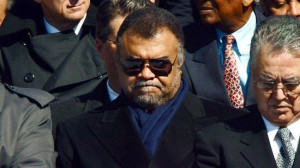Last may, the US House of Representatives approved a bill that would allow families of those killed in the 9/11 attacks to sue Saudi Arabia for its role in the terrorist plot, however it was immediately announced that Barack Obama may veto this law.
Saudi authorities have repeatedly denied any involvement in the 9/11 attacks, yet American lawmakers are convinced that the fact that 15 out of 19 terrorists that brought terror to US soil were citizens of Saudi Arabia means that Riyadh was in one way or another connected. Those who lost their loved ones in the 9/11 attacks have repeatedly tried to sue the Saudi royal family, along with Saudi banks and charities that are suspected of financing terrorism, but those attempts were unsuccessful largely due to laws introduced back in 1976 that provided other states with immunity from US lawsuits.
However, should the new law come into effect, foreign countries would no longer enjoy this immunity and they will be forced to face lawsuits if their actions resulted in the deaths of American citizens in the United States.
At the same time, the announcement that this bill was taken negatively in Saudi Arabia itself came as no surprise. Should lawsuits be pursued after the introduction of this law, Saudi assets could possibly be seized in the US and Riyadh would have no say in the matter, forcing Saudi authorities to sell all of their assets in the United States or risk them being frozen or confiscated. For this reason, in mid-April, the kingdom has already announced that in the case of the adoption of the law, it would have to sell 750 billion dollars worth of assets, although later on, an announcement was made that the Saudis only have 117 billion dollars in assets within the US.
A senior Saudi politician Abdullah Al al-Sheikh announced that this legislation sets a dangerous precedent in the field of international relations. In turn, the Cooperation Council for the Arab States of the Gulf (GCC), which encompasses six states, including Saudi Arabia, announced that the bill contradicts the fundamental principles of relations between the countries, in particular the principle of sovereign state immunity.
The UAE and Qatar urged the Obama administration to oppose this law, as it was reported by the official news agency of the Emirates WAM. UAE Minister of Foreign Affairs Abdullah bin Zayed bin Sultan Al Nahyan noted that the introduction of the bill will have serious consequences.
It is noteworthy that the vote on the bill in the House of Representatives occurred in just two months after the release of the previously classified 28 pages of the report on the alleged involvement of Saudi Arabia in the 9/11 attacks, drafted by a special commission. Declassified materials showed numerous contacts between terrorist associates and Saudi Prince Bandar Bin Sultan, who occupied the post of the Saudi Ambassador to Washington for some time, notes USA Today.
The Independent would note in one of its articles:
The classified pages are in a file titled “Finding, Discussion and Narrative Regarding Certain Sensitive Narrative Matters”, which have never been published from the findings of the Joint Congressional Inquiry into the attacks which killed 3,000 people and injured more than 6,000 others.
Former President George W Bush claimed the publication of this part of the report would damage America’s national security by revealing “sources and methods that would make it harder for us to win the War on Terror.
Analysts at Foreign Policy would label the deterioration between US and Saudi Arabia relations as “the long divorce.”
Bush’s invasion of Iraq has jeopardized the delicate balance of power in the Persian Gulf, with Sunni leader Saddam Hussein replaced by a Shia government. Now Obama is trying to restore the balance, but the decision to abandon the support of the former Egyptian President Hosni Mubarak in the height of the so-called Arab Spring forced Riyadh into reconsidering its future. However, Obama’s demand to topple the legitimate president of Syria, Bashar al-Assad, struck the right chord in Saudi Arabia, which teamed up with Qatar and other “friends of Syria” in order to support anti-Damascus forces by all means possible.
When Washington entered into nuclear talks with Iran, Saudi Arabia expressed concern about the fact that Americans could change sides in the Middle East, which brought them to the conclusion that they have no other choice but to act independently, beginning an air military campaign against Houthi resistance in Yemen, which is supported by Iran, without even notifying the United States.
It must be noted that the US-Saudi alliance is something twisted and unnatural, since America likes to present itself as the ultimate champion of democracy, while Saudi Arabia is widely regarded as the most oppressive regime on earth. Additionally, Riyadh has been behind the creation and the continuous support of sectarian terrorists for decades. At some point those factors were to come into play in the bilateral relationships between the United States and Saudi Arabia. There’s a serious number of influential figures in the Western military and across the political establishment that would vocally criticize Washington for its cooperation with Saudi Arabia considering the nation’s close ties with Al-Qaeda and ISIS.
Jean Périer is an independent researcher and analyst and a renowned expert on the Near and Middle East, exclusively for the online magazine “New Eastern Outlook”

